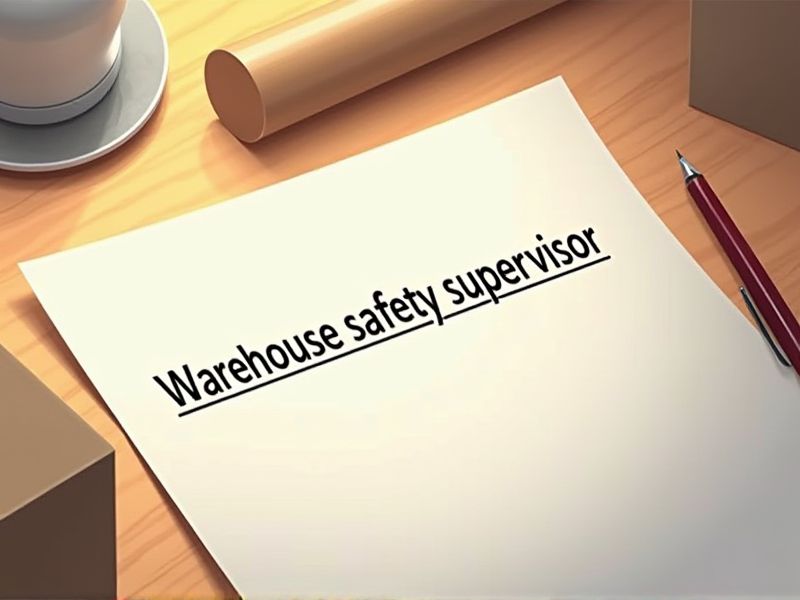
Warehouse safety supervisors play a critical role in maintaining a secure working environment, minimizing accidents, and ensuring compliance with regulatory standards. Certifications provide them with specialized knowledge in risk assessment, hazardous material handling, and emergency response. Through targeted training, they gain skills necessary to implement and oversee safety protocols effectively. Here are several key certifications that may be essential for a Warehouse safety supervisor.
OSHA 10-Hour Warehouse Safety Certification
Warehouse environments often present numerous hazards related to machinery, heavy lifting, and materials handling. OSHA 10-Hour Warehouse Safety Certification equips supervisors with necessary skills to identify and mitigate these risks, reducing workplace accidents. This certification ensures supervisors are well-versed in federal safety regulations, fostering a compliant and safe working environment. Moreover, trained supervisors can effectively educate other employees, promoting a culture of safety throughout the warehouse.
OSHA 30-Hour Safety Certification
The OSHA 30-Hour Safety Certification provides warehouse safety supervisors with in-depth knowledge of safety and health hazards, enabling them to effectively identify and mitigate risks. This certification enhances a supervisor's ability to ensure regulatory compliance, reducing the likelihood of workplace injuries and costly penalties. It equips supervisors with the skills to conduct thorough safety inspections and implement preventative safety measures. Training through this certification fosters a culture of safety within the warehouse, leading to improved workplace morale and productivity.
Forklift Operator Certification
Forklift Operator Certification ensures that warehouse safety supervisors have a thorough understanding of forklift operations and safety protocols, directly reducing accident-related incidents. Lack of certification can lead to improper handling of equipment, increasing the risk of accidents and injuries. Certified supervisors can more effectively train and oversee employees, ensuring adherence to safety standards. Certification helps in maintaining compliance with industry regulations, thereby minimizing potential legal and financial liabilities.
First Aid/CPR Certification
Being trained in First Aid/CPR equips a warehouse safety supervisor with the immediate skills to respond to onsite accidents, potentially saving lives. Quick intervention during medical emergencies can minimize the severity of injuries or health issues among warehouse staff. Supervisors with this certification can foster a safer working environment, encouraging employees to adhere to safety protocols. With warehouses prone to accidents due to heavy equipment and machinery, certified supervisors help reduce liability risks for the employer.
Lockout/Tagout (LOTO) Certification
Lockout/Tagout (LOTO) Certification is essential for a warehouse safety supervisor because it ensures they are equipped to prevent unexpected machinery startups, thereby reducing the risk of accidents. Without proper LOTO practices, workers face increased danger from hazardous energy during equipment maintenance. The certification provides supervisors with the knowledge to implement and enforce effective safety protocols. Compliance with LOTO regulations also protects the warehouse from potential legal liabilities.
Hazard Communication Certification
Hazard Communication Certification equips warehouse safety supervisors with the necessary knowledge to identify and communicate chemical hazards effectively, reducing potential exposure risks among staff. Understanding labeling and Safety Data Sheets enables supervisors to implement appropriate safety measures and emergency procedures. This certification helps ensure compliance with OSHA standards, minimizing legal liabilities for the organization. Proper hazard communication enhances overall workplace safety culture, promoting a more informed and vigilant workforce.
Confined Space Entry Certification
Confined Space Entry Certification is necessary for a warehouse safety supervisor because it provides the knowledge required to identify and evaluate potential hazards in enclosed areas. Understanding these risks can lead to implementing essential safety measures that protect workers from accidents or injuries. Certification ensures that the supervisor can develop and oversee emergency rescue plans, reducing response time during incidents. Proper training in confined space protocols fosters a culture of safety, thereby supporting legal compliance and minimizing liability for the warehouse.
Emergency Response Certification
Emergency Response Certification is crucial for a Warehouse Safety Supervisor because it equips them with the skills to handle unexpected crises effectively. When emergencies occur, trained supervisors can manage the situation, minimizing potential injuries and damage. Proper certification ensures compliance with legal regulations, reducing liability risks for the company. Trained individuals also promote a culture of safety, enhancing overall workplace morale and productivity.
Fire Safety and Suppression Certification
Fire Safety and Suppression Certification equips warehouse safety supervisors with crucial skills to identify and mitigate fire risks, thereby reducing the chance of destructive incidents. It ensures adherence to legal safety regulations, protecting the warehouse from potential fines and liabilities. Certified supervisors can implement effective emergency response strategies, minimizing property damage and risking lives. Training enhances awareness of advanced suppression technologies, enabling swift action to control potential fire outbreaks.
NEBOSH General Certificate in Occupational Health and Safety
The NEBOSH General Certificate in Occupational Health and Safety equips warehouse safety supervisors with essential knowledge to identify and mitigate potential workplace hazards. With this qualification, supervisors can effectively implement health and safety protocols, reducing accident rates and enhancing overall safety awareness. It helps businesses comply with legal safety standards, thereby avoiding costly legal implications and fostering a safer working environment. This certificate also boosts the supervisor's credibility, ensuring trust and assurance among the workforce regarding safety practices.
Summary
By obtaining certifications, you enhance your ability to identify and mitigate potential hazards in warehouse operations. Certifications validate your expertise, leading to increased trust from both management and team members. When safety standards improve, accident rates tend to decrease, resulting in fewer workplace injuries. Over time, this contributes to a more efficient warehouse environment and could potentially lower insurance premiums for the company.
